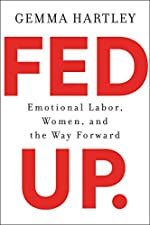Fed Up: Emotional Labor, Women, and the Way Forward
June 25, 2020 7:55 AM - by Hartley, Gemma - Subscribe
Fed Up: Emotional Labor, Women, and the Way Forward is Gemma Hartley's expanded version of her article Women Aren't Nags—We're Just Fed Up, which was published in Harper's Bazaar (Sept. 2017). Readers who remember our 2015 discussion about emotional labor (which gets a shout-out from Hartley) will recognize the book's themes: the struggle to define EL; EL at home and in the working world; and the challenges of finding a way to share the load, redefining what matters, and creating more egalitarian partnerships.
From the book:
"Being seen as a nag is one reason women spend so much mental energy choosing whether to delegate tasks, otherwise known as 'asking for help'--which most women don't want to have to ask for in the first place....Being the nag takes extensive emotion work to get people to comply....I don't want to give up the work of caring. I just want others to care as well."
"[My husband] does not see the organization of a life as anything more than a perfunctory task. I see it as a measure of my love and, furthermore, my self-worth....The fact that men aren't expected to perform emotional labor may make their lives easier, but it doesn't necessarily make their lives better. Ignoring emotional labor makes men passive consumers of their own lives. It stops them from being deeply involved partners, fathers, sons, friends."
Towards a solution, and becoming clearer on our priorities with emotional labor:
"We must not only see the value of our emotional labor but show ourselves that we value it by setting strong boundaries and making sure we are performing emotional labor in a way that doesn't leave us feeling overwhelmed, undervalued, and used....[W]e must become clear on our priorities, on what the highest and best use of our time is, if we want emotional labor to really work for us."
From the book:
"Being seen as a nag is one reason women spend so much mental energy choosing whether to delegate tasks, otherwise known as 'asking for help'--which most women don't want to have to ask for in the first place....Being the nag takes extensive emotion work to get people to comply....I don't want to give up the work of caring. I just want others to care as well."
"[My husband] does not see the organization of a life as anything more than a perfunctory task. I see it as a measure of my love and, furthermore, my self-worth....The fact that men aren't expected to perform emotional labor may make their lives easier, but it doesn't necessarily make their lives better. Ignoring emotional labor makes men passive consumers of their own lives. It stops them from being deeply involved partners, fathers, sons, friends."
Towards a solution, and becoming clearer on our priorities with emotional labor:
"We must not only see the value of our emotional labor but show ourselves that we value it by setting strong boundaries and making sure we are performing emotional labor in a way that doesn't leave us feeling overwhelmed, undervalued, and used....[W]e must become clear on our priorities, on what the highest and best use of our time is, if we want emotional labor to really work for us."
You are not logged in, either login or create an account to post comments

posted by jenfullmoon at 3:33 PM on June 25, 2020 [1 favorite]